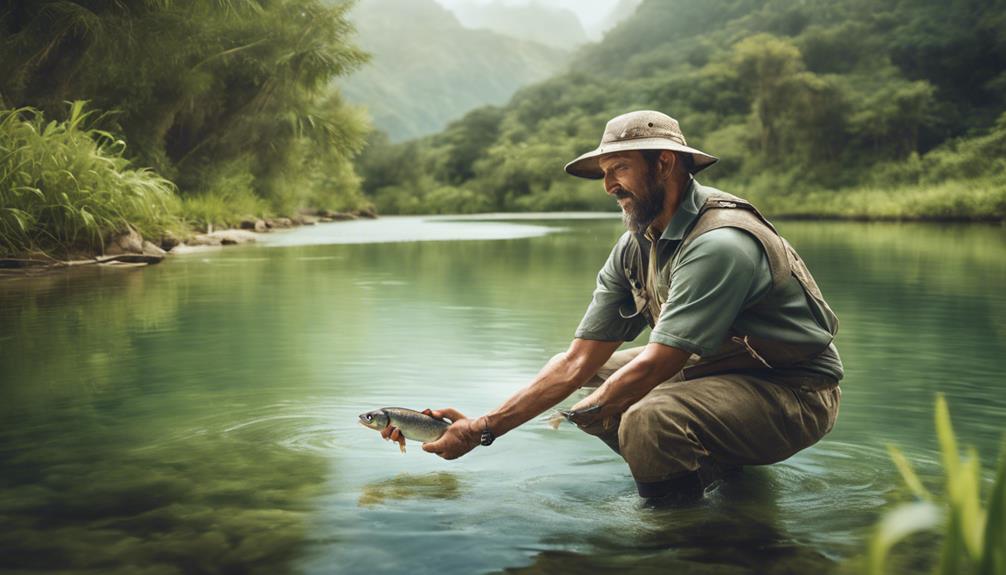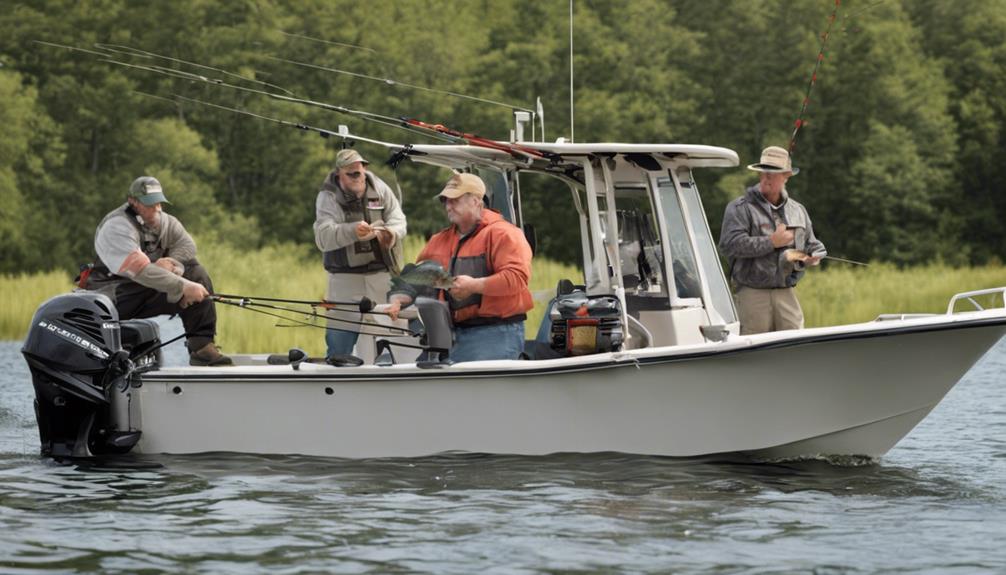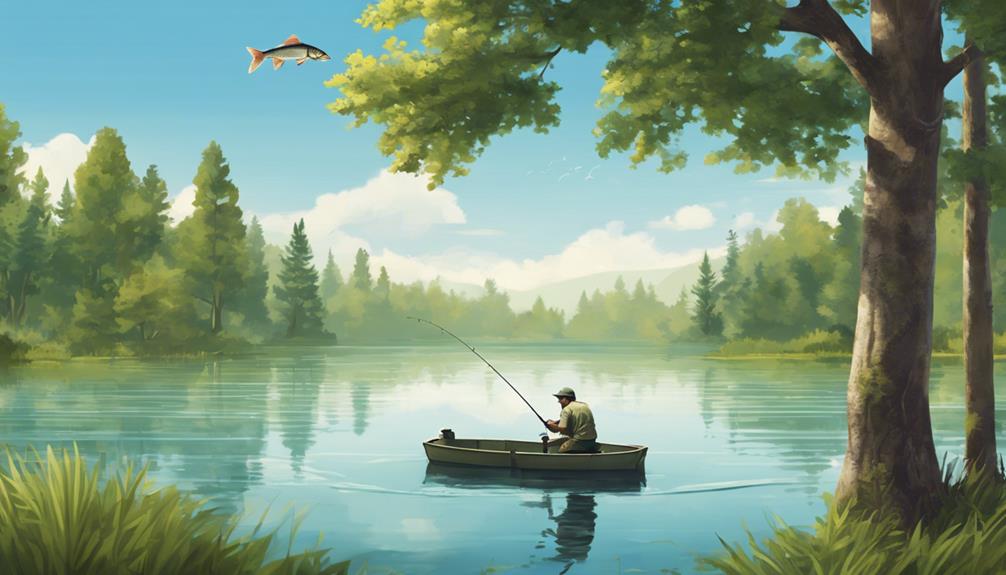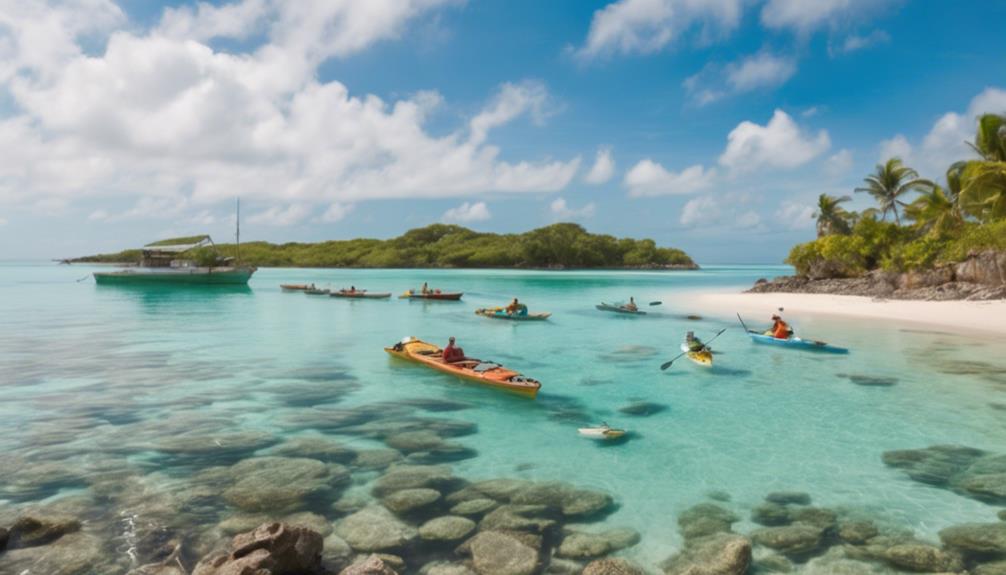Imagine a tranquil lake at dawn, its surface shimmering with the first light of day. As an angler, you hold the key to preserving this beauty for generations to come.
By following 14 proven strategies for aquatic conservation, you can make a significant impact on the health of our waters. From sustainable fishing practices to habitat restoration initiatives, each action you take plays a vital role in safeguarding our aquatic ecosystems.
But what are the other strategies that can amplify your efforts and ensure a sustainable future for our waters?
Sustainable Fishing Practices
To ensure the long-term health of aquatic ecosystems, you must adopt sustainable fishing practices. Ethical sourcing and ecosystem preservation are key components of sustainable fishing that every angler should prioritize. When you engage in ethical sourcing, you're making a conscious decision to choose fishing methods that minimize harm to the environment and wildlife. This includes avoiding practices that result in overfishing or cause damage to marine habitats.
By practicing ethical sourcing, you contribute to the preservation of aquatic ecosystems. This preservation is crucial for maintaining biodiversity and ensuring the balance of marine life. When you prioritize ecosystem preservation, you help protect the delicate relationships between different species within the ecosystem. This, in turn, supports the overall health and sustainability of the aquatic environment.
As an angler committed to sustainable fishing practices, you have the power to make a positive impact on the environment. By choosing to fish responsibly and ethically, you set an example for others to follow. Your actions can help create a culture of conservation within the angling community, leading to greater awareness and protection of our precious aquatic resources. Remember, every choice you make while fishing has the potential to either harm or help the ecosystems you enjoy, so choose wisely.
Catch and Release Techniques
Implementing effective catch and release techniques is essential for preserving fish populations and promoting sustainable angling practices. To ensure the best outcomes for both the fish and the angler, follow these key strategies:
- Proper handling: When handling a fish you intend to release, make sure your hands are wet to avoid damaging the protective mucous layer on the fish's skin. Avoid touching the gills or eyes, as these are sensitive areas that can easily be harmed. Support the fish horizontally and avoid squeezing it tightly to prevent internal injuries.
- Use barbless hooks: Barbless hooks are easier to remove and cause less damage to the fish's mouth, increasing the chances of a successful release. They also reduce handling time, which is crucial for the fish's well-being.
- Minimize air exposure: Keep the fish in the water as much as possible, especially for species that require high levels of dissolved oxygen. Limiting air exposure reduces stress on the fish and improves its chances of survival post-release.
- Release success: Before releasing the fish, make sure it's fully revived and able to swim away on its own. Hold the fish gently in the water, moving it back and forth to help oxygenate its gills until it swims away strongly. Monitoring the fish as it swims off ensures a successful release and contributes to conservation efforts.
Habitat Restoration Initiatives
Considering the vital role healthy habitats play in supporting fish populations, engaging in habitat restoration initiatives is a proactive step towards preserving aquatic ecosystems for future generations. Ecosystem restoration aims to improve the overall health of aquatic environments by restoring damaged habitats and enhancing biodiversity. Wetland rehabilitation, in particular, is a crucial aspect of habitat restoration as wetlands serve as essential breeding grounds and nurseries for many fish species.
Participating in ecosystem restoration projects allows you to directly contribute to the conservation of aquatic ecosystems. By volunteering or supporting organizations dedicated to habitat restoration, you can help create healthier environments for fish to thrive. Restoring habitats not only benefits fish populations but also contributes to the overall balance of aquatic ecosystems, supporting the interconnected web of life underwater.
Wetland rehabilitation plays a significant role in maintaining the ecological balance of aquatic environments. Wetlands act as natural filters, improving water quality and providing essential habitats for a variety of aquatic species. By actively engaging in wetland restoration efforts, you can help protect these critical ecosystems from degradation and ensure their sustainability for future generations of fish and wildlife.
Invasive Species Management
Effective management of invasive species is crucial for protecting native aquatic ecosystems and their biodiversity. As an angler, you play a vital role in preventing the spread of invasive species through your actions on the water. Here are some key strategies to help you in managing invasive species:
- Learn to Identify: Educate yourself about invasive species that may be present in the waters you fish. Early detection is essential for effective management.
- Clean Your Gear: Always clean your fishing gear, including boats, waders, and boots, to remove any potential hitchhiking invasive species. This simple step can prevent their spread to new environments.
- Report Sightings: If you spot any invasive species while out fishing, report it to the relevant authorities promptly. Early reporting can lead to swift action to contain and manage the invader.
- Support Research Efforts: Stay informed about invasive species management initiatives in your area and support research efforts. By contributing to research or participating in monitoring programs, you can help detect and manage invasive species before they cause extensive harm.
Responsible Waste Disposal
To ensure the protection of aquatic environments, always dispose of waste responsibly while engaging in angling activities. Waste management plays a crucial role in maintaining the health of water ecosystems. When fishing, make it a priority to clean up after yourself by properly disposing of any trash or leftover bait. Leaving waste behind can harm aquatic life and disrupt the balance of the ecosystem. By practicing good waste management, you contribute to environmental stewardship and help preserve the natural beauty of the waters you enjoy.
Environmental stewardship involves taking responsibility for the impact you have on the environment while fishing. This includes being mindful of the waste you produce and making conscious efforts to minimize it. Simple actions like carrying a small trash bag with you, properly disposing of fishing line, and not leaving any plastic materials can go a long way in protecting aquatic habitats. Remember, every little bit of waste properly disposed of makes a difference in maintaining the cleanliness and integrity of our waterways.
Advocacy for Clean Waterways
Championing for the protection of clean waterways is crucial for safeguarding aquatic ecosystems and promoting sustainable angling practices. Advocacy for clean waterways involves actively engaging in efforts to maintain water quality and prevent pollution. Here are some key actions you can take to support this cause:
- Monitor Water Quality: Stay informed about the water quality in your local waterways by following reports from environmental agencies. Understanding the health of the water bodies you fish in can help you advocate for necessary improvements.
- Reduce Plastic Waste: Minimize your use of single-use plastics while fishing and dispose of any trash properly. Plastics can leach harmful chemicals into the water, impacting both aquatic life and water quality.
- Participate in Clean-up Events: Join clean-up initiatives in your area to help remove litter and pollutants from water bodies. Your active involvement in these events can make a significant difference in maintaining clean waterways.
- Educate Others: Spread awareness about the importance of clean waterways and pollution prevention among fellow anglers and the community. Encourage others to adopt responsible practices to protect our aquatic environments for future generations.
Support for Fish Population Surveys
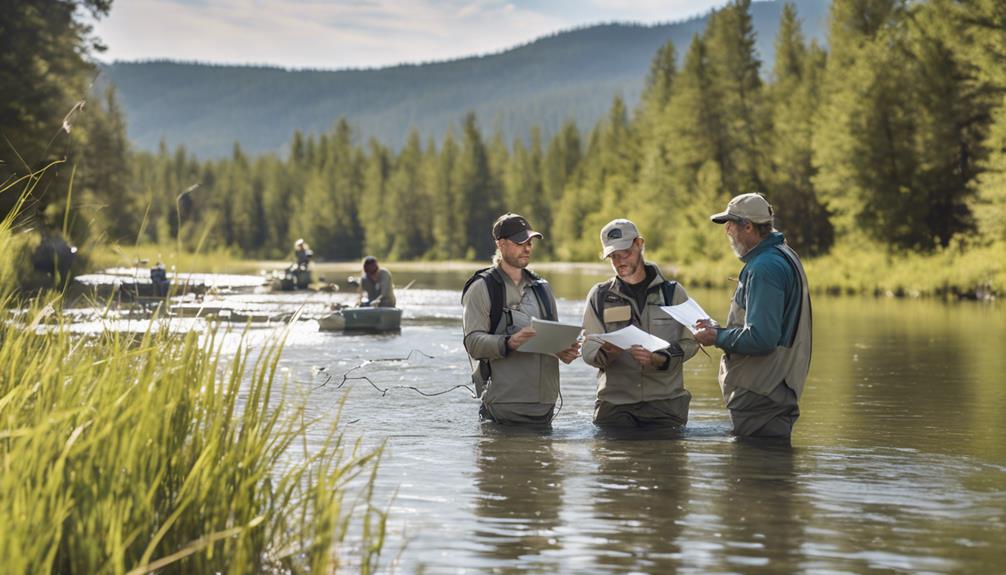
Engage in assisting fish population surveys to contribute to the conservation efforts of aquatic ecosystems and the sustainability of angling practices. Fish population surveys play a crucial role in understanding the health of fish populations and the overall ecosystem. By supporting these surveys, you can actively participate in the conservation and management of fish species.
One way to support fish population surveys is through fish tagging. Fish tagging involves attaching small markers to fish to track their movements, growth, and behavior. By volunteering to tag fish or reporting tagged fish that you catch, you can provide valuable data to researchers and help monitor fish populations effectively.
Population monitoring is another essential aspect of fish conservation. By participating in population monitoring programs, such as citizen science initiatives or angler surveys, you can contribute valuable information on fish abundance and distribution. This data is crucial for making informed decisions about fishing regulations and conservation measures.
Your involvement in fish population surveys is a direct way to support the sustainability of angling practices. By understanding the dynamics of fish populations, researchers and conservationists can implement measures to ensure healthy fish stocks for future generations of anglers. So, get involved, tag some fish, and participate in population monitoring efforts to make a meaningful impact on aquatic conservation.
Collaboration With Conservation Organizations
Collaborating with conservation organizations amplifies your impact on aquatic ecosystems and enhances the sustainability of angling practices. By engaging in partnerships with these organizations, you can contribute significantly to the preservation of aquatic habitats and the conservation of fish populations. Here are four key ways in which collaboration with conservation organizations can benefit both the environment and angling community:
- Access to Expertise: Conservation organizations often employ scientists and specialists who possess valuable knowledge about aquatic ecosystems. By partnering with these organizations, you can gain access to their expertise, which can help you make more informed decisions regarding angling practices and environmental conservation.
- Community Engagement: Collaborating with conservation organizations allows you to engage with a broader community of like-minded individuals who are passionate about preserving aquatic environments. Through community outreach programs and events organized by these organizations, you can connect with other anglers and conservationists to work together towards common goals.
- Resource Sharing: Conservation organizations may have access to resources such as funding, equipment, or research data that can support your efforts to promote sustainable angling practices. By forming partnerships with these organizations, you can leverage their resources to achieve greater impact in your conservation initiatives.
- Advocacy Opportunities: Working with conservation organizations provides you with advocacy platforms to raise awareness about environmental issues affecting aquatic ecosystems. By participating in advocacy campaigns and initiatives led by these organizations, you can amplify your voice and influence policymakers to implement conservation measures that benefit aquatic habitats and fish populations.
Frequently Asked Questions
How Can Anglers Contribute to Overall Ecosystem Health Beyond Sustainable Fishing Practices?
To contribute to overall ecosystem health, anglers can go beyond sustainable fishing by getting involved in ecosystem monitoring and community engagement.
By participating in conservation education programs, anglers can learn how to protect water quality and habitats.
What Are Some Lesser-Known Invasive Species That Anglers Should Be Aware of in Their Local Waters?
When fishing in your local waters, it's crucial to be aware of lesser-known invasive species that can harm the ecosystem. Preventing the spread of these invaders is key to protecting the balance of your aquatic environment.
Being informed about the local ecosystem impacts of these species can help you make a positive difference in preserving the health of your fishing grounds. Stay vigilant and take action to safeguard your waters from these threats.
Are There Any Specific Guidelines for Handling Bycatch While Practicing Catch and Release Techniques?
When it comes to catch and release techniques, proper handling of bycatch is crucial. By following guidelines for bycatch management, you can help minimize harm to unintended species.
Remember to handle bycatch with care, using wet hands or gloves to protect their delicate skin and gills. Avoid removing them from the water for too long and release them gently to give them the best chance of survival.
How Can Anglers Support Habitat Restoration Initiatives in Their Community?
To support habitat restoration initiatives in your community, get involved in restoration projects. By volunteering your time, you can actively engage in environmental stewardship.
These projects help improve aquatic ecosystems, benefiting local wildlife and communities. Your contribution makes a difference in preserving and enhancing natural habitats.
Joining restoration efforts allows you to connect with like-minded individuals and positively impact the environment around you. Get involved and make a difference in your community's conservation efforts.
What Role Do Anglers Play in Advocating for Policy Changes to Protect Clean Waterways for Future Generations?
As an angler, you hold a crucial role in advocating for policy changes to safeguard clean waterways for future generations. Your voice matters in grassroots movements pushing for water conservation policies.
By actively participating in environmental education efforts and engaging policymakers, you can help shape regulations that protect aquatic habitats.
Your passion and advocacy can make a real difference in ensuring clean and healthy water ecosystems for years to come.
Conclusion
By implementing these proven strategies, you can make a significant impact on aquatic conservation efforts.
Whether it's practicing sustainable fishing, supporting habitat restoration initiatives, or advocating for clean waterways, every action counts.
Remember, as an angler, you have the power to protect our aquatic ecosystems and ensure the health and vitality of fish populations for future generations to enjoy.
Together, we can make a difference in preserving our precious waterways.
